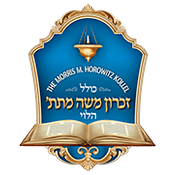Parshas Balak 1


׳׳…ויחבוש את אתונו…׳׳ במדבר כב:כא ׳׳…תמת נשפי מות ישרים…׳׳ במדבר כג:י
“…And he saddled his she-donkey…” Bamidbar 22;21
“…May my soul die a death of the righteous…” Bamidbar 23;10
Rashi explains that Hashem scolded Bilaam – רשע , wicked one, are you unaware that Avraham Avinu, the father of the Bnei Yisrael, already preceded you in this act? We all know the famous pasuk from the ׳׳וישכם אברהם בבוקר…׳׳ ,עקידה – “and Avraham hastened in the morning and he saddled his donkey”. The Kotzker asks, what is the connection and comparison between Avraham Avinu and the רשע , Bilaam? He explains the message that Hashem was delivering to Bilaam as follows. The founder of the nation of עם ישראל saddled his donkey at dawn’s first light in order to please Hashem and fulfill His will by sacrificing his firstborn son, Yitzchok. Despite all this, Hashems ultimate plan did not change, and Avraham was not allowed to commit the sacrifice as he had been commanded, for Hashem had destined עם ישראל to be born from Yitzchok. All the more so, Bilaam, don’t think for a second that by proceeding to precede in the morning to saddle your own donkey in order to invoke a curse over עם ישראל, that your actions will bear fruit against the will of Hashem.
Bilaam was blinded by his hatred towards the Bnei Yisrael. He became so overrun by his שנאה that he failed to realize that he was but mimicking the actions of Avraham Avinu so many years prior, yet expecting different results. Bilaam was quotably insane. In the end, Bilaam blessed the Bnei Yisrael and pled ׳׳תמת נפשי מות ישרים׳׳ – that his death should be akin to that of the אבות . (As the Baal Haturim brings down that ׳׳ישרים׳׳ is numerically equivalent to ׳׳אבות העולם׳׳ .) The Baal Haturim continues to cite three places in which we find that the request for death is expressed using the לשון of ׳׳תמות׳׳ . The first time is in the Parsha of Bilaam, the second time is with regard to the fate of Shimshon – ׳׳תמות נפשי אם פלישתים׳׳ , and the third time is in Iyov ׳׳תמות בנואר נפשם׳׳. Bilaam wanted to live like a גוי and die like a איד . Hashem did not grant this master of perversion his final wish. Instead of the death of ישרים , Bilaam died a מיתת פלישתים (the death of בנואר ,(רשעים – in his youth, as Chazal tell us that Bilaam was 34 years old when Pinchas killed him by the sword.
No matter who we think we are, we cannot fight with Hashem. His will is pre-ordained and irrevocable. Hashem has a plan that we cannot change. Our job is to decipher our particular role in the master plan and work towards fulfilling it. Bilaam had tremendous capabilities but allowed himself to be blinded by his emotions; by his hatred, greed, and delusions of grandeur. We can learn from his mistakes and use our own abilities to focus and not lose sight of our goals, fulfill רצון ד׳ and secure the infinite legacy of .מות ישרים
Moshe Rothenberg / MMHK
